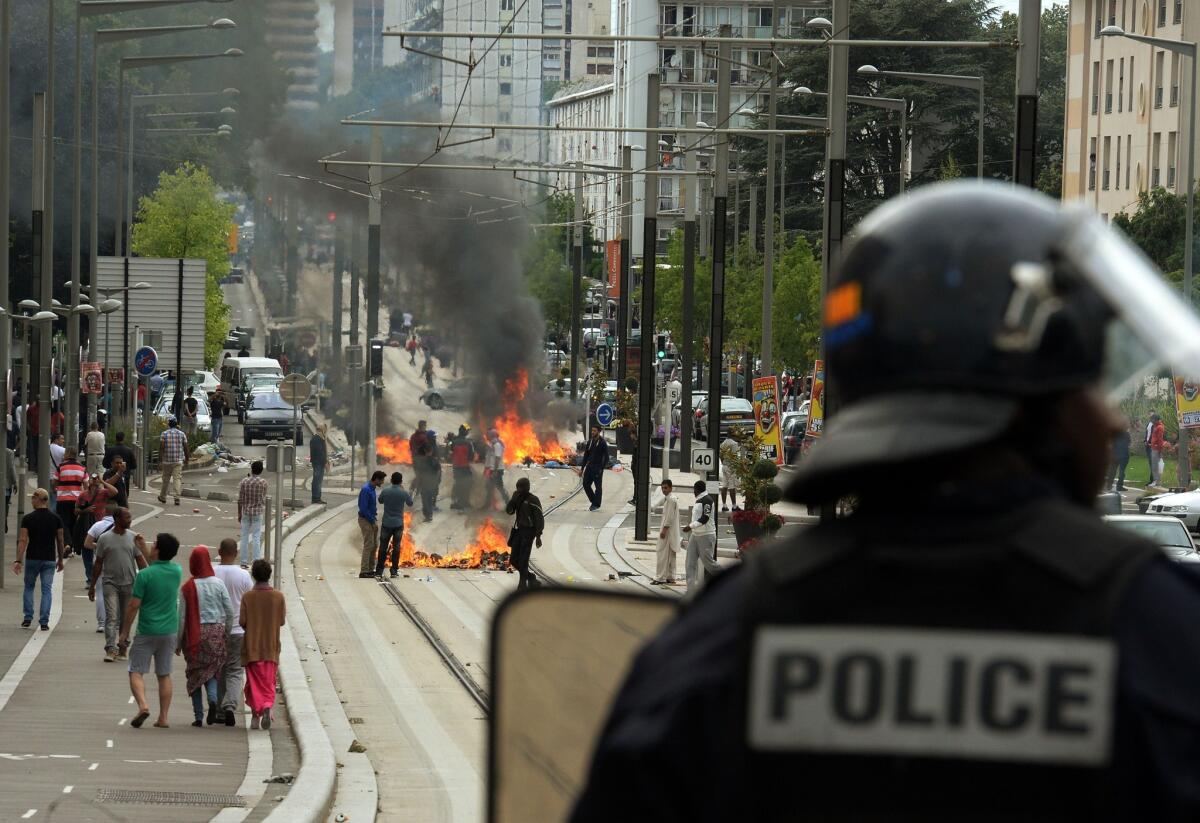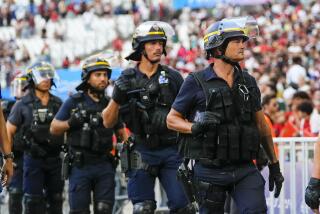French officials decry rioters who target synagogue, Jewish shops

French politicians across the political divide on Monday denounced pro-Palestinian rioters who attacked a synagogue and Jewish-owned shops in a Paris suburb.
Hours after the Sunday night clashes between riot police and demonstrators angered at Israel’s invasion of Gaza, ministers and opposition members of the French Parliament united to castigate what Prime Minister Manuel Valls said were “intolerable” acts that were clearly anti-Semitic.
“To attack a synagogue and a kosher grocery store is quite simply anti-Semitism and racism,” Valls said during an official visit to the southeast of France on Monday.
Interior Minister Bernard Cazeneuve went to the scene of the violence in Sarcelles, in the northern Paris suburbs, and echoed his senior colleague’s criticism of what he called “serious, unacceptable acts” of anti-Semitic violence.
“When you threaten synagogues and when you burn a grocery because it is Jewish-owned then you are committing anti-Semitic acts,” he told reporters. “Protest against Israel is legitimate. Nothing can justify such violence.”
Violence had first erupted during a banned pro-Palestinian demonstration in the French capital on Saturday afternoon. Police arrested 30 people and 18 law enforcement officers were slightly injured when youths began pelting them with stones and bottles. Police responded with tear gas.
An additional 18 youths were reportedly arrested as violence erupted for a second time on Sunday in the city suburb, which has a large Jewish community. Most of the several thousand demonstrators at Saturday’s protest were peaceful, but French media said police blamed both outbreaks of violence on a hard-line group of pro-Palestinian youths.
On Sunday several hundred pro-Palestinian protestors gathered in front of the local railway station. Late in the afternoon, clashes erupted in front of the local synagogue between police and protestors carrying iron bars and wooden batons. In the chaos that ensued, fire broke out at the synagogue but was rapidly brought under control.
Several shops were attacked and set on fire, including a Jewish-owned grocery store that was reportedly destroyed.
Claude Bartolone, president of the ruling Socialist Party in the lower house of Parliament, the National Assembly, did not mince his words. On his blog he said those who had attacked the synagogue and Jewish stores were “fanatical gangs” and “rampaging hordes.”
“Nobody insults a human being because he is a Jew without being subject to abject condemnation; nobody participates or supports an attack on a Jewish business without being part of a movement that threatens above all to lead civilization into barbarity,” he wrote.
Opposition politicians also attacked the violence, but accused the government of being to blame by banning the Paris march on Saturday and the demonstration in Sarcelles on Sunday. They said that by outlawing the protest, the government had attracted troublemakers.
However, Francois Fillon, the former center-right prime minister in ex-president Nicolas Sarkozy’s administration, said he supported the government’s firm line against the rioters.
“The unity of the Republic is not negotiable,” he wrote on his blog. “The government is right to ban these demonstrations. It cannot take the risk of seeing the Israel-Palestinian conflict spill over onto our territory.”
Francois Pupponi, the mayor of Sarcelles, told BFMTV that the violent attacks were carried out by a “horde of savages.”
Roger Cuikerman, head of the Representative Council of Jewish Institutions in France, an umbrella group, said there was increasing concern among French Jews at growing anti-Semitism in France.
While he said he understood protests against the Israeli government, attacks on Jews simply for being Jewish were “deeply disturbing.”
“Anti-Zionism is just another form of anti-Semitism. They are not screaming, ‘Death to the Israelis’ on the streets of Paris. They are screaming, “Death to the Jews,’” Cuikerman told Radio France International.
He said France’s Jewish community was not just afraid but “anguished.”
Last month, the Jewish Agency for Israel, which coordinates migration to Israel, said 1,407 of France’s estimated 500,000 Jews left for Israel in the first three months of the year, four times more than for the same period in 2013.
In 2013, 3,288 French Jews left for Israel, a 72% increase from the year before, and the first time French émigrés outnumbered those from the United States.
Jewish authorities say the emigration wave has been prompted by a number of factors, including France’s economic crisis, the success of far-right parties in France and elsewhere in Europe, and a sense that anti-Semitism, a constant in France, was becoming more worrying.
A week before last week’s violence, protestors tried to storm two synagogues in Paris to protest Israeli policy toward Gaza. It was this that led to the ban on further demonstrations in Paris.
Authorized rallies and protests took place in cities outside the French capital with no reports of serious violence.
Willsher is a special correspondent.
More to Read
Sign up for Essential California
The most important California stories and recommendations in your inbox every morning.
You may occasionally receive promotional content from the Los Angeles Times.









